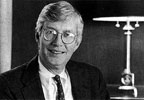

His sights appropriately raised, Strassburger earned his graduate degrees from Cambridge and Princeton and began a successful career as a history professor, program officer for the National Endowment for the Humanities, and academic vice-president.
All the while, Muller and another deeply influential Bates historian, Sidney "Toby" Jackman (later also a mentor at Cambridge), stayed in Strassburger's vision as great teachers and friends. "Jackman invited me to concerts of eighteenth-century music and gently explained that I shouldn't clap between movements," he remembers. "He then had me up to his apartment, which held an eighteenth-century chair. `Sit in it!' he said. For a young guy from Milwaukee, it was like seeing culture for the first time."
Ernie Muller, says Strassburger, was a professor who always got involved in "other contexts" of students' lives. "He always came to Outing Club picnics, for example. Even now, this kind of personal interest seems the clearest way we honor our promise as residential colleges to our students."
On November 3, Ernie Muller's timely encouragement to his former Bates student bears particularly sweet fruit. Muller, an undergraduate alumnus of Ursinus College in Pennsylvania, will see Strassburger installed as the eleventh president of Ursinus.
John Strassburger's career in higher education has been a textbook preparation for a college presidency. He taught for twelve years as a history professor at Hiram College in Ohio, administering Hiram's study-abroad program in Dublin, Ireland, and their Center for Regional Studies. He then served for two years as an NEH program officer, helping the NEH become more involved in liberal-arts college curricula and winning distinguished service awards for his results.
Discovering that he liked administration but missed teaching and campus life, he spent the last decade as professor of history, dean of the college, and vice president for academic affairs at Knox College in Illinois. Displaying a future president's horror of an idle hour, he found time for everything: a scholarly article each year, a half-dozen local or regional boards of directors, and a decade as a Bates Alumni-in-Admissions volunteer. He also committed substantial time to several forms of national professional service.
In his first year as president of Ursinus, Strassburger is finding much to preserve and praise, some careful and hard choices of resource allocation to be made, and the expected tidal wave of small issues that end up on his desk. As Bates President Don Harward says with a rueful smile, a reality of small liberal-arts colleges is that "all decisions are immediately appealable to the president."
Strassburger so far has dealt with everything from the promising (how to start a multicultural unity center with a lively program but without increasing college staff) to the painful (listening to the parents and friends of a student suspended for alcohol violations) to the semi-comic ("What are you going to do about the bugs in my dormitory?").
As he's settled into the job, Strassburger has been helped by the friendship and advice of Parker Marden '61. A long-time academic dean at Beloit College in Wisconsin, Marden is a also a new college president, serving at Manchester College in Indiana.
Strassburger has found much at Ursinus to praise and preserve. Ursinus's reputation needed to catch up with much of its reality, and "part of a president's job is not to mess up the momentum of the college." He found, for example, an extraordinary faculty, partly a legacy of successful recruiting and partly due to Ursinus's proximity to the Philadelphia urban area, which helps the college attract dual-career academic families.
"What happened at Bates in the seventies and eighties is now happening at Ursinus. It is seen as a school much on the move and a school whose reputation is expanding outward from a regional base," he said.
Strassburger expects to spend substantial time on three major issues in the years ahead. First, as Ursinus's overall reputation for academic excellence has increased, just how the college communicates and defines that excellence becomes crucial. Second, as technology begins to deliver the information historically contained in the curriculum, colleges must define their value (and justify their tuition) by the quality of the college experience and the strength of the college community. As a result, student-life issues will consume more of a president's time. "With technology, we don't need to be residential to swap information, so we will need to reconcile residential life with all the other goals of the college," says Strassburger. Third, like all presidents, Strassburger will need to lead his community to make hard choices about resource allocation. During the eighties, "Ursinus deferred personnel and budget decisions. Now we need to decide how to 'lean up' delicately without cutting quality or losing our momentum."
At Bates, Strassburger was a regular in theatrical productions. Director of Theater Lavinia Schaeffer, never above a little typecasting when it would strengthen a show, cannily chose Strassburger as Horatio in Hamlet. In retrospect, many of the character traits of Horatio -- intelligence, reflection, loyalty, friendship, honesty, and the ability to value and judge a community -- are the traits of a good college president. John Strassburger, it seems, has them all in abundance.
By William C. Hiss '66